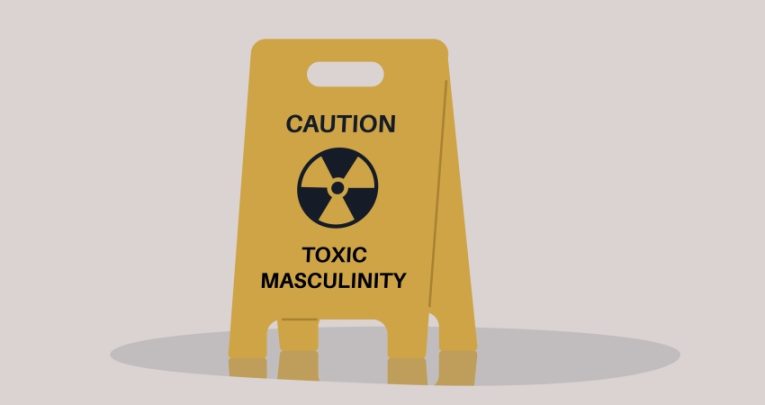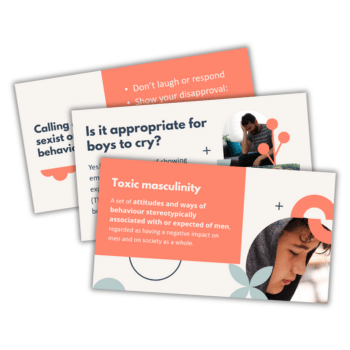Misogyny in schools – How to tackle it in primary & secondary

What draws boys to misogynistic messaging and how can educators tackle this culture from the very beginning of formal education? Join us as we explore the issue…

- by Teachwire
- Classroom expertise and free resources for teachers

In the UK, a woman is killed by a man every three days. In recent years we’ve seen a frightening rise in hatred of women and misogynistic views. This makes it vital to tackle the issue of misogyny in schools, and not just when pupils reach secondary age.
Here, educators explain what they’re doing to tackle misogyny in schools, with lots of advice that you can apply to your own setting…
Table of contents
Activities to challenge gender stereotypes
Primary schools are in a unique position to challenge harmful stereotypes through everyday teaching, inclusive values, and a whole-school approach. By addressing these issues from the start, we give children the tools to build a more respectful and equal society, says teacher Kirsty Ruthven…
EYFS
Children can explore language, colours and play choices with their supportive adults. Young pupils can see that all activities and opportunities are for everyone, and that we help everyone to take part.
For example, one activity could be planning an imaginary birthday party – what colour balloons should we get? What kind of card can we design? Which toy might they like as a birthday gift?
What matters here is the imaginary birthday child as an individual, their likes and dislikes – not necessarily assumptions around what a boy or girl might like.
EYFS is also a great time to start engaging with parents on a range of topics and to build trusting relationships.
KS1
Conversations can start to become more focused on the language of gender stereotypes. It is important that children have the opportunity to learn about a variety of ways to be human.
For example, are men in caring roles as accessible to children as women explorers and pioneers? This might mean when you are teaching a topic on Antarctica, you are sure to include examples of female explorers and adventurers.
Frame discussions around what kind of qualities you need to be a great explorer rather than assumptions that strength and courage are limited to men alone.
Similarly, when studying Florence Nightingale or Mary Seacole, it is a great opportunity to explore men in caring roles, too. Perhaps a male nurse can come and visit the class to discuss the care and empathy he needs to do his job.
KS2
In KS2, you can introduce further nuance and explicit teaching. Interrogate the media for ‘fake news’ as a way to teach the harmful effects of stereotyping.
Adults can also take a non-negotiable approach for opportunistic teachable moments, just as they would for homophobic and racist incidents.
Link other activities to mental health and wellbeing, the role of online influencers, and navigating healthy relationships.
One idea could be for pupils to team up to plan, storyboard, film and edit their own social media shorts, with messaging focused on inclusion, positivity and challenging gender stereotypes and sexism.
5 ways to kick misogyny out
Take a holistic approach
Look at the whole curriculum. Important discussions can happen in PSHE, but also across a range of learning. There will be unplanned and planned opportunities to model, teach and discuss empathy, kindness and respecting others.
Link up learning
Connect conversations on misogyny to racism, homophobia and other prejudices. Look at imbalances of power and privilege to frame conversations and help children to understand the harmful effects.
Use books
There are so many fantastic texts that show a range of ways of being a human, from great picturebooks to thought-provoking chapter books, such as:
- Jabari Jumps by Gaia Cornwall
- Look Up! by Nathan Bryon
- We’re Going to Find the Monster! by Malorie Blackman
- A Dress with Pockets by Lilly Murray
- Tough Guys (Have Feelings Too) by Keith Negley
Teach, model and practise critical thinking
This could be through oracy, philosophy sessions, or engaging with media sources. Empower children to question what they see and how they might interact with information that could be untrue.
Value your values
Connect learning on misogyny, sexism and gender stereotypes to values as a way to share with the whole school community what they look like in practice
Kirsty Ruthven is a primary school teacher, PhD researcher, and service manager at The Children’s Society, which has developed an evidence-based, free curriculum called Beyond Gender Stereotypes.
How Streatham Wells Primary School is tackling misogyny
Bringing the whole school together to challenge violence against women and girls can transform your culture and your curriculum, explains headteacher Sarah Wordlaw…
The definition of misogyny is ‘a dislike of or ingrained prejudice against women’. This is a safeguarding issue affecting all people.
Every time we switch on the news, or Netflix, we are confronted with a barrage of stories of violence against women and girls, both for information and entertainment. It needs to stop, and it starts with education.
At Streatham Wells Primary, our journey began with a commitment to tackle this face on. We want to ensure that our children can be part of creating a safer and more equal world.
For any project to be successful, it has to lie deep within the fabric of the school’s vision. Our curriculum vision statement is simple – to be actively anti-racist, anti-homophobic, anti-sexist, anti-ableist, and to acknowledge intersectionality.
Teachers delved into our data: language used by children in behaviour incidents; pupil voice on happiness; whose voices are amplified in the classrooms; who represents the school, etc.
This data was critical in looking at what we could do to make a change. I took on leading the Lambeth Violence Against Women and Girls (VAWG) forum. This included making links with professionals locally who work with and support women and girls who have been victims of gender-based violence. It also meant communicating with those who support and teach men to recognise and fight against VAWG.
Developing resources
We used the information we found to develop teaching sequences that focus on critically thinking about consent, and gender stereotypes. These considered the harmful messages we hear about what ‘femininity’ and ‘masculinity’ mean.
We have also used the evolution of Disney characters to analyse ideas of masculinity and femininity. We’ve brought parents into the conversation about online harms. We have also worked with organisations such as White Ribbon that help men to tackle misogyny.
Tackling misconceptions
A misconception when thinking about tackling misogyny in schools is that it is a women’s problem. It’s not. It’s everyone’s problem.
However, we need to be mindful when educating children about this issue. This is so that the message given to children isn’t women = good, men = bad.
It is important to teach pupils about harmful stereotypes about masculinity. However, if the first time we teach and name masculinity is calling it toxic, that could do more damage than good to our boys.
It is extremely important to teach about positive masculinities. We need to encourage empathy, kindness, showing emotions, listening to alternative points of view, and developing emotional literacy.
Mind your language
If we tell a child to “stop crying” when they are feeling upset, we are teaching them that showing their emotions is bad. If we use language such as “toughen up”, “man up” or “boys will be boys”, we are setting boys up to fail.
To overcome this, a school culture of being open to challenge and being challenged is imperative. Regular and targeted staff training around language, pedagogy and backing it up with relevant research is a way to battle to and to grow together.
And of course, always linking it back to the overall aim of the curriculum is important, too. For example, in our school we are actively anti-discriminatory. This is why we continue to develop our language and understanding around key issues.
No quick fixes
Undoing the deeply ingrained gender stereotypes in our society takes time. It’s certainly not a quick fix. We have seen a significant improvement in children’s awareness of key issues surrounding gender equality. They know how to use their voice to advocate for others.
Children ask each other for consent regularly (to use equipment, play games, give high fives or hugs, etc). They understand that no means no.
This development in children’s oracy means that we are seeing improvement in children’s speaking and listening, and in their happiness at school (we measure this through pupil voice surveys).
But there are always gains to be made. So moving forward, we are going to continue to work on representation in our curriculum. This is not just representation of the amazing, strong women who have shaped global history, but also representation of positive masculinity. We need to show that to be a man is not to be simply one thing.
To do so we highlight well-known figures such as Harry Styles and Elliot Page. They show that masculinity can mean softness and strength, and everything in between.
Sarah Wordlaw is the headteacher of Streatham Wells Primary. She is also chair of the Lambeth VAWG Forum and author of Time to Shake Up the Primary Curriculum.
Does your secondary school have an ‘Andrew Tate problem’?
Nicole Rodden examines what draws young boys to the misogynist messaging of Andrew Tate and others, and what educators can do in response…
Healthy relationships are the foundation of a happy and healthy life. But while working as a teacher, I was surprised by how many of my pupils simply didn’t know what a healthy relationship was.
Their idea of what’s ‘normal’ and ‘healthy’ is increasingly learned from the internet – a limitless source of ideas that can shape beliefs and guide behaviours.
One belief that an increasing number of boys and young men are internalising is that feeling insecure or vulnerable is shameful. This is rather than simply being a normal and healthy part of life. This goes beyond simple teenage awkwardness; a number of boys now will do anything to avoid feeling vulnerable.
Entitlement culture
Society has arguably failed to give them an alternative to this narrative. There’s a lack of positive male role models in popular culture who are defined by empathy instead of aggression. However, what media and popular culture does often teach them is entitlement.
Seeing men receive attention, respect and love, boys begin believing these things are owed to them. Related to this is that many can also struggle to find a sense of purpose, but are unable to show this sadness and frustration because society isn’t a safe place in which they can reveal such insecurities.
Enter Andrew Tate.
He first came to popular attention as a social media influencer who said shocking and offensive things. But his appeal is far more complex.
A core part of Tate’s influencer personality is his ‘self-help’ offering. This sees him teach millions of male followers how to become an ‘alpha’ by pursuing a luxurious lifestyle, prioritising physical fitness and dominating others – especially women.
This can be an attractive proposition for boys, especially those not offered a viable alternative vision of masculinity.
Male identity
Tate promises to help his audience extinguish their insecurity and build a new sense of identity based on confidence, aggression and dominance. The exploitation and harming of women isn’t a side-effect of Tate’s ideology; it’s the very method by which his followers lay claim their male identity.
Unfortunately, schools aren’t well supported in addressing this issue and are terrified of getting it wrong. Half of all RSHE teachers don’t feel confident navigating such difficult conversations with pupils, and we can’t blame them when there’s little guidance to follow.
I know of one school where staff felt powerless to confront Tate’s beliefs, and simply banned all discussion of him within its halls – a likely common response.
However, discussion is the surest means by which schools can help young people ‘unlearn Tate’, form a healthier understanding of relationships and ultimately make better choices for themselves and others.
Unlearning misogyny
Educators must remember that pupils learn about sex and relationships through unfiltered, frequently decontextualised content on platforms such as TikTok and YouTube and from online pornography – content that will be much more adult than the traditional RSHE offered in schools.
It may be difficult, but young people want to be spoken to like adults. As much as possible, RSHE discussions should be similarly unfiltered, use plain language and avoid dancing around the issue with metaphors of teacups and consent.
Such discussions form a crucial part of unlearning misogyny in schools and other harmful beliefs. Pupils’ lives are increasingly lived online, with apps and direct messages their primary channels of communication.
This, combined with COVID’s broader impact on social development, has created a generation of young people who often lack the skills to communicate their needs, whether it’s talking about their feelings, dealing with rejection or showing someone affection.
In-person discussion helps them develop the oracy skills needed to express themselves, feel vulnerable and navigate the social complexities of life.
Consent education
The wider cultural conversations around these kinds of complexities are in constant flux. The ‘Everyone’s Invited’ campaign, for example, was a game-changer.
More than 50,000 people shared their experiences of surviving sexual assault, uncovering the very real and dangerous scope of sexual assault experienced by young people across the country, and the urgency with which it needs to be addressed.
Schools have an important role to play in this change. Relationship violence prevention programmes, which can form part of a school’s RSHE provision, have been shown to reduce sexual harassment and assault among young people.
To create a more open and empathetic environment, we need to foster open conversations between all genders.
Consent education has been an incredibly important and positive development in this area, but there are other issues on the ground that must be addressed too.
Teachers have found that focusing on consent has made boys nervous of accusations of non-consensual sex, and have told us that this approach reinforces other damaging beliefs about sex.
Instead, we must teach all students that consent needs to be mutually agreed, and that both parties are active and equal participants.
This will in turn help counter the dichotomy of how we view pleasure. We often shame girls for sexual expression while boys are praised and rewarded.
Compassion and respect
Ultimately, chastising boys will only make them more vulnerable to the influence of people like Andrew Tate. Instead, schools can support them by discussing the complexities of relationships with compassion and respect.
It’s the broader negative influence of online content, coupled with scarce healthy examples of masculinity that we need to address. Our culture’s definition of masculinity remains narrow and damaging.
The current generation of young people has a chance to change this for the better. If we can teach boys to embrace their vulnerability, and find their identity in compassion and kindness, they will build a very different world. One we all deserve to grow up in.
How to tackle misogyny in schools
- Adopt a whole school, holistic approach to relationships and wellbeing
- Develop a spiral RSHE curriculum that builds students’ understanding over time
- Embed consent into how the school approaches pastoral support, wellbeing and safeguarding
- Create safe spaces for discussion in both single sex and mixed groups; it’s crucial that students come together and share their experiences with peers
- Don’t limit conversations to Andrew Tate; discuss wider issues and incorporate positive and
- alternative narratives
- Equip students with the skills to build healthy relationships; this includes being able to communicate their needs, talk about their feelings and deal
- with rejection
- Give teachers the skills and confidence to handle difficult conversations and provide ongoing support. Don’t expect them to handle everything on their own
- Pool resources with other schools to share insights, experiences and best practice
Nicole Rodden is a former RSHE teacher and Co-Founder of Life Lessons; for more information, visit lifelessons.co.uk or follow @lifelessonsrse










